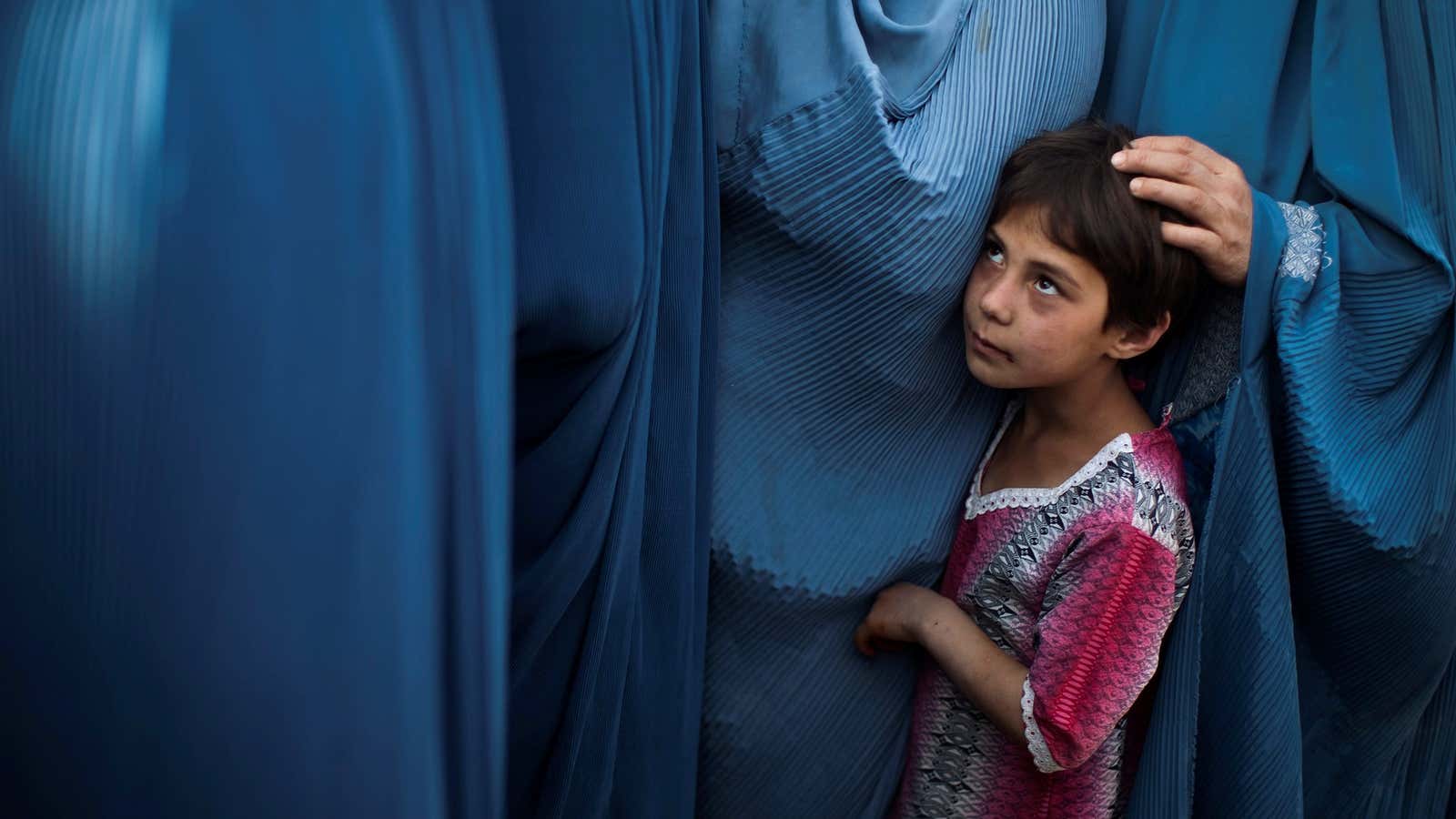The Taliban, which has taken over Kabul and is now effectively in control of Afghanistan, declared today that it will allow women to participate in the government, in accordance with its interpretation of sharia. In previous statements aimed at reassuring women of their safety in the country, it had promised to respect their right to study and work.
But the reality on the ground paints a different picture: From whitewashing images of women on billboards, to threats to female public figures, to women forced to leave their workplace, much suggests women could lose the rights they had painstakingly conquered in the past few years.
Many fear a return to the violent oppression they faced under the Taliban regime in the 1990s.
A big step backward
Emblematic of just how much Afghan women had been able to accomplish in the past decade—and how much they risk losing—is their workforce participation, which went up more than 50% since 2011.
During the previous Taliban regime, between 1996 and 2001, women were not allowed to study and work. In less than a decade, after the situation in the country stabilized after the war, they were able to claim their right to a profession and education, making up, for instance, the majority of students of Herat University.
In the past few days, several women working in banks have been threatened and sent home, and so have female university students. Images of women are being whitewashed in the streets of Kabul, and locals report of businesses such as beauty parlors being closed.
Despite denials from the Taliban, some reports of girls and young women being kidnapped, raped, and forced to marry militants are starting to surface, bringing back the worst memories of the previous Taliban occupation, and suggesting that fighters on the ground might not be following Taliban official directives, says Peymana Assad, the first UK elected official of Afghan origin, who spoke with Quartz hours after being evacuated from Kabul.
“What is happening in Afghanistan today is going to put this country 200 years back,” Mahbouba Seraj, the founder of the Afghan Women Network, a local women’s rights organization, said in a video.
The immediate danger for prominent women
Women who have been outspoken against the Taliban regime, or who rose to prominent public roles in recent years, arguably face the highest threat, as they might be immediate victims of retaliation. There are about 250 female judges in Afghanistan (about 10% of the total), as well as many lawyers, politicians, and journalists who are now in hiding and fearing for their lives. Several have already reported receiving threats in the past weeks.
While senior government officials have been able to flee the country, many women who held administrative and political roles have been left behind without protection. “They will come for people like me and kill me,” Zarifa Ghafari, Afghanistan’s youngest and first female mayor told British publication iNews.
Since the Taliban took over Kabul, she adds, all public broadcast of music has been interrupted, and women have been told to go home. Rukshana Media, an Afghan women-led news organization, has been reporting that many female reporters are hiding or working anonymously.
What can be done for Afghan women?
While there is no short-term path to solving the situation, the first order of business should be to guarantee the physical safety of as many women as possible by doing away with bureaucratic procedures, says Mina Sharif, an Afghan rights advocate who had left Afghanistan last year due to Covid-19, but was planning to return home.
Accepting refugees isn’t a long-term solution to the problem, Sharif highlights, but can save lives in the peak of the emergency. ” Let as many people as possible leave the country and figure out the bureaucracy later,” says Sharif, who has been advocating for emergency visas for Afghans under threat. “I don’t trust the bureaucracy to support us in saving lives. And that’s why emergency visas and fleeing is what I’m supporting right now, because it’s life or death.”
But though it might be possible to help some higher-profile women who have been outspoken against the Taliban get out, Sharif says it is harder to think of ways to aid the women and girls who might be abducted and forced to marry Taliban fighters, or those who will have to live the day-to-day violence the incoming regime is known for.
To help them, Sharif says it’s important for the international community not to recognize the Taliban government or give it legitimacy in any way, and to impose sanctions on those who aided the invasion of Afghanistan by Taliban forces, in particular Pakistan, which she says isn’t being held responsible by the international community for its role in housing the Taliban.
“Even at this critical stage, the language is ‘neighboring countries’. No one is saying Pakistan,” she says. “Where the violence and the terrorism is coming from is from across the border in Pakistan.”
